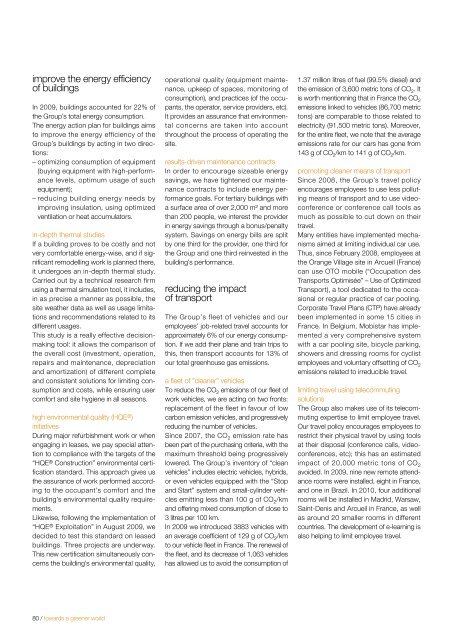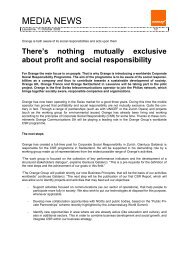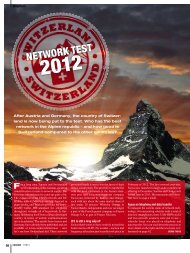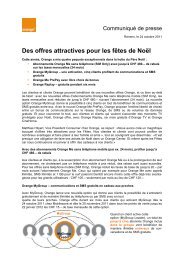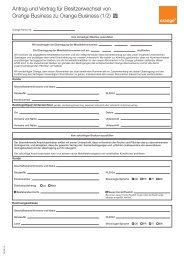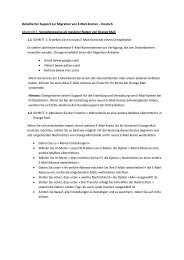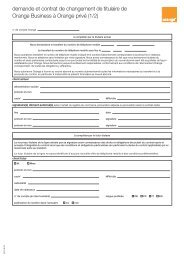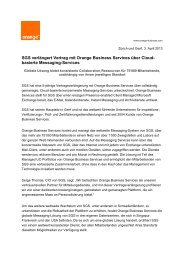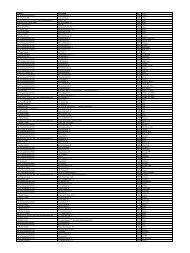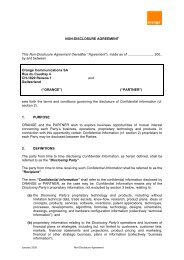corporate social responsibility complete report France ... - Orange
corporate social responsibility complete report France ... - Orange
corporate social responsibility complete report France ... - Orange
You also want an ePaper? Increase the reach of your titles
YUMPU automatically turns print PDFs into web optimized ePapers that Google loves.
improve the energy efficiency<br />
of buildings<br />
In 2009, buildings accounted for 22% of<br />
the Group’s total energy consumption.<br />
The energy action plan for buildings aims<br />
to improve the energy efficiency of the<br />
Group’s buildings by acting in two directions:<br />
– optimizing consumption of equipment<br />
(buying equipment with high-performance<br />
levels, optimum usage of such<br />
equipment);<br />
– reducing building energy needs by<br />
improving insulation, using optimized<br />
ventilation or heat accumulators.<br />
in-depth thermal studies<br />
If a building proves to be costly and not<br />
very comfortable energy-wise, and if significant<br />
remodelling work is planned there,<br />
it undergoes an in-depth thermal study.<br />
Carried out by a technical research firm<br />
using a thermal simulation tool, it includes,<br />
in as precise a manner as possible, the<br />
site weather data as well as usage limitations<br />
and recommendations related to its<br />
different usages.<br />
This study is a really effective decisionmaking<br />
tool: it allows the comparison of<br />
the overall cost (investment, operation,<br />
repairs and maintenance, depreciation<br />
and amortization) of different <strong>complete</strong><br />
and consistent solutions for limiting consumption<br />
and costs, while ensuring user<br />
comfort and site hygiene in all seasons.<br />
high environmental quality (HQE ® )<br />
initiatives<br />
During major refurbishment work or when<br />
engaging in leases, we pay special attention<br />
to compliance with the targets of the<br />
“HQE ® Construction” environmental certification<br />
standard. This approach gives us<br />
the assurance of work performed according<br />
to the occupant’s comfort and the<br />
building’s environmental quality requirements.<br />
Likewise, following the implementation of<br />
“HQE ® Exploitation” in August 2009, we<br />
decided to test this standard on leased<br />
buildings. Three projects are underway.<br />
This new certification simultaneously concerns<br />
the building’s environmental quality,<br />
operational quality (equipment maintenance,<br />
upkeep of spaces, monitoring of<br />
consumption), and practices (of the occupants,<br />
the operator, service providers, etc).<br />
It provides an assurance that environmental<br />
concerns are taken into account<br />
throughout the process of operating the<br />
site.<br />
results-driven maintenance contracts<br />
In order to encourage sizeable energy<br />
savings, we have tightened our maintenance<br />
contracts to include energy performance<br />
goals. For tertiary buildings with<br />
a surface area of over 2,000 m² and more<br />
than 200 people, we interest the provider<br />
in energy savings through a bonus/penalty<br />
system. Savings on energy bills are split<br />
by one third for the provider, one third for<br />
the Group and one third reinvested in the<br />
building’s performance.<br />
reducing the impact<br />
of transport<br />
The Group’s fleet of vehicles and our<br />
employees’ job-related travel accounts for<br />
approximately 6% of our energy consumption.<br />
If we add their plane and train trips to<br />
this, then transport accounts for 13% of<br />
our total greenhouse gas emissions.<br />
a fleet of “cleaner” vehicles<br />
To reduce the CO 2 emissions of our fleet of<br />
work vehicles, we are acting on two fronts:<br />
replacement of the fleet in favour of low<br />
carbon emission vehicles, and progressively<br />
reducing the number of vehicles.<br />
Since 2007, the CO 2 emission rate has<br />
been part of the purchasing criteria, with the<br />
maximum threshold being progressively<br />
lowered. The Group’s inventory of “clean<br />
vehicles” includes electric vehicles, hybrids,<br />
or even vehicles equipped with the “Stop<br />
and Start” system and small-cylinder vehicles<br />
emitting less than 100 g of CO 2 /km<br />
and offering mixed consumption of close to<br />
3 litres per 100 km.<br />
In 2009 we introduced 3883 vehicles with<br />
an average coefficient of 129 g of CO 2 /km<br />
to our vehicle fleet in <strong>France</strong>. The renewal of<br />
the fleet, and its decrease of 1,063 vehicles<br />
has allowed us to avoid the consumption of<br />
1.37 million litres of fuel (99.5% diesel) and<br />
the emission of 3,600 metric tons of CO 2 . It<br />
is worth mentionning that in <strong>France</strong> the CO 2<br />
emissions linked to vehicles (86,700 metric<br />
tons) are comparable to those related to<br />
electricity (91,500 metric tons). Moreover,<br />
for the entire fleet, we note that the average<br />
emissions rate for our cars has gone from<br />
143 g of CO 2 /km to 141 g of CO 2 /km.<br />
promoting cleaner means of transport<br />
Since 2008, the Group’s travel policy<br />
encourages employees to use less polluting<br />
means of transport and to use videoconference<br />
or conference call tools as<br />
much as possible to cut down on their<br />
travel.<br />
Many entities have implemented mechanisms<br />
aimed at limiting individual car use.<br />
Thus, since February 2008, employees at<br />
the <strong>Orange</strong> Village site in Arcueil (<strong>France</strong>)<br />
can use OTO mobile (“Occupation des<br />
Transports Optimisée” – Use of Optimized<br />
Transport), a tool dedicated to the occasional<br />
or regular practice of car pooling.<br />
Corporate Travel Plans (CTP) have already<br />
been implemented in some 15 cities in<br />
<strong>France</strong>. In Belgium, Mobistar has implemented<br />
a very comprehensive system<br />
with a car pooling site, bicycle parking,<br />
showers and dressing rooms for cyclist<br />
employees and voluntary offsetting of CO 2<br />
emissions related to irreducible travel.<br />
limiting travel using telecommuting<br />
solutions<br />
The Group also makes use of its telecommuting<br />
expertise to limit employee travel.<br />
Our travel policy encourages employees to<br />
restrict their physical travel by using tools<br />
at their disposal (conference calls, videoconferences,<br />
etc); this has an estimated<br />
impact of 20,000 metric tons of CO 2<br />
avoided. In 2009, nine new remote attendance<br />
rooms were installed, eight in <strong>France</strong>,<br />
and one in Brazil. In 2010, four additional<br />
rooms will be installed in Madrid, Warsaw,<br />
Saint-Denis and Arcueil in <strong>France</strong>, as well<br />
as around 20 smaller rooms in different<br />
countries. The development of e-learning is<br />
also helping to limit employee travel.<br />
80 / towards a greener world


